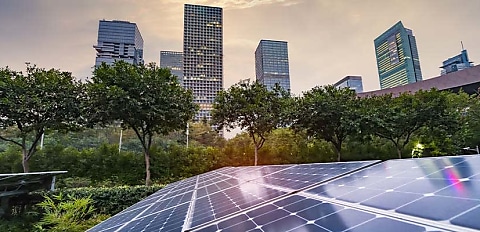A new joint report by the Property Council of Australia and the Green Building Council of Australia has called for every Australian home to be given an energy performance rating, allowing buyers or renters to know the energy efficiency of their home before moving in.
The report titled ‘Every Building Counts’, highlighted 39 recommendations and calls for the federal government to implement a suite of property-focused policy recommendations that would help Australia achieve its decarbonisation goals.
Among the recommendations include the creation of a national rating scheme for the energy performance of homes.
While there are moves towards lifting standards for more environmental efficiency and better performance of new dwellings — such as through the 7-star NatHERS thermal ratings launched last year — the move would help improve the performance of existing dwellings.
The recommendation has also been backed by the three biggest mortgage lenders – Commonwealth Bank, Westpac and National Australia Bank, along with Bank Australia, which signed a joint statement on the idea earlier this month (19 April).
The banks, alongside peak industry bodies (including Property Council, Australian Sustainable Finance Institute, and more) came together to urge state, territory, and federal governments to act decisively to improve the performance of homes across Australia.
Banks are keen on a national standard to help reduce the credit risk associated with lending to borrowers living in inefficient properties, as it could reduce power bills. In addition, it would help mortgage holders improve the comfort and performance of their homes and strengthen relationships with customers.
According to the Energy Efficiency Council, millions of Australians are living in dwellings that can’t be adequately heated or cooled at an affordable cost.
For example, more than 1.3 million detached houses in Victoria alone are estimated to have a NatHERS rating of two stars or less, increasing the risk of preventable physical and mental health problems.
To support Australians building new energy-efficient homes, Westpac will launch a new Green Home Loan offer with a discounted interest rate for eligible customers.
Westpac Group chief executive Peter King said: “We want to encourage customers looking to build a new home to consider more energy efficient designs which could help reduce their emissions and power bills.
“Along with our existing car loan offer for hybrid or electric vehicles, this announcement is another example of how we’re giving customers more options to support their sustainability goals.”
Indeed, the move would create financial incentives to reduce emissions, many of which already exist today in the way of green lending.
CBA has recently announced that it was expanding its range of green financing to support home loan and personal loan customers to enhance the energy efficiency of their homes and purchase electric and hybrid vehicles.
In addition to installing new items, customers can also use the Green Loan to upgrade their existing small-scale renewables by adding products like a battery pack or additional solar panels.
Commonwealth Bank’s group executive retail banking Angus Sullivan said Australians are thinking carefully about making sustainable choices that can help them save money.
The bank’s data revealed that 64 per cent of customers would consider buying an electric or hybrid car if there was a financial incentive.
“Which is why we are expanding the amount of funding, and the range of products, available under our Green Loan,” Mr Sullivan said.
NAB, another signatory of the industry statement towards energy smart homes, has also been working alongside CoreLogic in the development of the CSIRO’s RapidRate tool, which will help customers better understand the energy efficiency in their homes.
The new artificial intelligence system, that is being piloted, combines the property data analytics company’s extensive property data with CSIRO’s machine learning algorithms to provide insights on the heating and cooling load and energy efficiency of homes.
NAB chief executive Ross McEwan said: “We recognise the importance of the coming years to 2030 and the need to get the settings right to support the structural change required to transition to net-zero.
“It is critical to ensure we have credible and consistent labels for what is ‘green’.”
Government committed to energy efficiency targets
The government has broadly committed to an expansion of Australia’s existing rating regime for new homes to cover existing homes.
Speaking during the major economies forum (20 April) in the US, via telepresence, Prime Minister Anthony Albanese said strong climate action is at the very top of the government’s agenda and it is a clear priority for the Australian people.
“Our 2030 target — 43 per cent below 2005 levels — will require ambitious action, but we are determined to achieve it,” Mr Albanese said.
“We’re making sure we get more renewable energy into homes and businesses by modernising our energy grid, and we’re encouraging our industries to take up clean energy technologies through a new national government investment vehicle, our National Reconstruction Fund.”
Mr Albanese added the government had already put “our 215 biggest industrial emitters” on the path to net zero by 2050 by passing a law that caps their emissions and recently announced Australia’s first National Electric Vehicle Strategy to increase the supply of electric vehicles and encourage their rapid uptake.
“Together, these actions will boost the share of renewable electricity generation in Australia to our target of 82 per cent by 2030,” Mr Albanese said.

